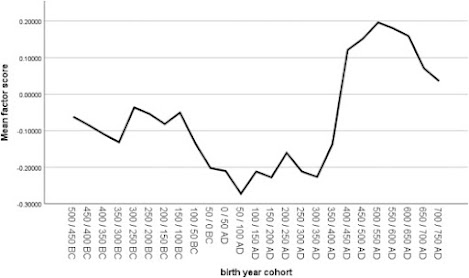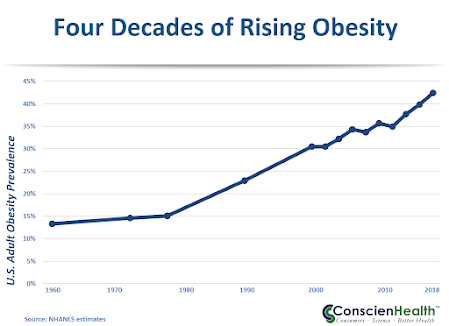The portrait of Larthia Seianti, Etruscan noblewoman, on her sarcophagus. She died probably during the 2nd century AD. As you can see, she was not exactly thin, you may even say that she was a little overweight. But, surely, she was not obese. The ancient Romans just didn't seem to have the obesity problem that plagues us nowadays. Yet, they had plenty of health problems. In this discussion, I argue that the moment of maximum growth of a civilization may correspond to the lowest level of health for its population and that, in our case, the obesity epidemic is a symptom of our global health crisis. Such is the law of the Seneca Cliff!
Surprisingly, I found that as we collapse our health may well improve -- at least for those who survive. It is a chain of thoughts that comes from a comparison with the case of the Roman Empire that, as usual, provides us with a roadmap for what we can expect for the future. But let me go in order.
The health problems associated with the decline of the Western society are often dismissed because "the life expectancy keeps increasing." That has been true up to recent times, although the Covid pandemic may signal a reversal of the trend. But life expectancy is just one of the many parameters that define human health. What, I think, is an indicator that something is badly wrong in the Western World is the epidemics of obesity.
You'll find, below, a post that I published on my "The Proud Holobionts" blog that summarizes some recent research on obesity. Basically, it seems that the main element causing it is added sugar in industrially processed food, although this is not by any means the only one.
How is the fact that the food industry puts extra sugar in their products related with the decline of our civilization? It is, in my opinion, because all the economic actors strive to maintain their profits even though the economy is declining. One way to do that is to reduce the quality of the products while maintaining their appearance and their price. So, the food industry tends to add a cheap ingredient (sugar) to almost everything. The added bonus is that, if sugar makes people fatter, they will eat more, and the industry will make more money. It is, in the end, our tendency to monetize everything that is leading us to our doom.
So, did the Ancient Romans have an obesity problem during their decline? For one thing, the term "obese" comes from the Latin "obesus," with the same meaning as today. The Romans knew what obesity is, but they tended to consider it as an attribute of other peoples or of depraved persons. Livy spoke of the obesus etruscus ('fat Etruscan') as an insult to a people he considered lazy and decadent.
We have some images from Roman times that show fat people. At least one emperor, Vitellius (15- 69 CE) (see the image here) was often represented, and derided, as fat and corpulent. Even Lucius Annaeus Seneca, who inspired the title of this blog, seems to have been overweight in old age. Yet, we have hundreds, perhaps thousands, of portraits of Ancient Romans, and very few are fat. Obesity just didn't seem to be a problem for the Romans: that seems to make sense: they didn't have our industrially processed food.
Yet, the Ancient Romans did have health problems. There is a fascinating study by Jongman et al., that reports this graph:
Here, the "Mean Factor Score" is a measure of the overall health of the Romans, as determined by their skeletons. Note how it reaches a minimum around the mid 1st century AD. This is amazing, because that was supposed to be the moment of maximum splendor for the Roman Empire! Yet, despite the moment of glory and of wealth, the Romans were sick of various ailments that stunted their growth and deformed their bones -- we can still see that in their skeletons. Poor diet, pollution, crowded towns, bad hygienic conditions, metal pollution, and the like.
Even more amazing is how the health of the people improved as the empire went through its death throes. It makes sense: the population went down, and the survivors could enjoy a healthier lifestyle, eat a better diet, and suffer less from pollution. They actually had to be lean and fit if they wanted to survive.
If we translate these considerations to our times, then it may well be that the obesity epidemic is a transient phenomenon of the "peak wealth" of our civilization: the result of a combination of pollution, stress, poor diet, crowding, etc., just like in Roman times. As we go down the Seneca curve, we'll be thin again. It will not be painless, though!
Saturday, May 21, 2022
by Ugo Bardi
The obesity epidemic keeps expanding. The above are, I believe, the most recent data available for the US. The COVID-19 lockdowns and isolation measures are reported to have made things even worse. This trend is simply horrendous: what the heck is happening to humankind? (Disclaimer: I am not a nutritionist, I am just someone who is fascinated by data and trends. And, of course, we are all interested in our health! Here, I report some data I found, hoping you may find them useful. Don't take them as the last word on the subject. As always, before acting on things that affect your health, do your own search and use your judgment about what works for you.)
The obesity epidemics had a considerable boost by the lockdowns during the Covid-19 pandemic. Coupled with the opposite effect, that obesity is a risk factor for people who contract Covid, you have a remarkable disaster in the making. With several Western countries having percentages of obese people close to or higher than 50%, one wonders what's going to happen in the future. Why are the human holobionts in such a poor shape?
First, the work by Raubenheimer and Simpson on the food preference of various animals. It is summarized in a recent book titled, "Eat like the Animals." (Mariner Books, 2021). Their discovery is easy to summarize: it seems that most living beings have a specific set point in their needs for the main nutrients. They seek a specific balance among proteins, fats, and carbohydrates. In particular, they aim at a minimum intake of protein. If animals are fed an unbalanced diet, for instance, poor in protein, they will tend to eat more food until they reach the right level. Raubenheimer and Simpson call this the "protein leverage hypothesis:"
The story is complicated, and I don't pretend to say anything new. I just want to attract your attention to some recent studies that I think shed some light on the mechanism of human obesity (but even our fellow dog holobionts are suffering from obesity).
"In a protein-poor but energy-rich food environment, humans will overeat carbs and fats to try to reach their protein target. However, when the only available diet is rich in protein, human will underconsume carbs and fats"
Since excess carbohydrates are stored in the body as fat, we can say that one of the causes of the obesity pandemic is that the human diet in Western countries is overstocked in carbohydrates.
Here comes Robert Lustig and his book "Metabolical" (Yellow Kite 2021) where he minces no words on how this is not only true but also a profitable strategy for the food industry. They discovered long ago that if they put more and more carbohydrates (sugars) in the food they sell, then people will get fat, they will eat more, and that will increase their profits. Just like sick people are a boon for medical doctors, obese people are a boon for food producers.
You don't believe that? Let me show you a picture I took a few days ago in an Italian supermarket:
There are four kinds of regular mayonnaise on sale, plus a fancy one with no eggs. Can you guess which is the only one that does not contain added carbohydrates? Let me tell you, it is the most expensive one among the regular ones. All the others contain sugar. Maybe it is not the same for all mayonnaise brands on the market, but I think it is significant. Food companies do add sugar everywhere, even when it is not called for by the traditional recipes. They deny that, but it is written on the list of the ingredients (I have pictures, if you don't believe me!)
Now, it may well be that there is much more to obesity than just carbohydrates, but I think that these results point at an important cause of the problem. There are data showing that what we are seeing may be a delayed effect of "peak sugar" that occurred around the year 2000. From then on, the amount of sugar consumed in the U.S. has been going slightly down. But it remains high.
The beauty of this is that, if it is true, with obesity we don't have such a wicked problem as others, say, global warming. We know that to avoid global warming, we should stop burning hydrocarbons, but it is also true that we can't just stop: billions of people would die. But we could stop, or at least strongly reduce, the extra carbohydrates added to processed food, and we could do it today. Nobody would die, but the problem would be eased and many people would be healthier! But this is the way things are in the world: no problem can ever be solved when there is somebody making money if it remains unsolved.
To make you happier, let me show you some data that tell us that a little excess weight (a little!) is not necessarily bad for your organism. Here are some data from Malcolm Kendrick's wonderful book "The Clot Thickens" (Columbus 2021).
BMI stands for "Body Mass Index" and the overall lowest risk of death is for a BMI of 25-30 that's normally classified as "overweight" (if you want to know, I am at BMI=27). Being underweight is a larger risk than being obese! But obesity has many other problems, not least in terms of self-esteem.
In the end, remember that you are a holobiont and that for hundreds of millions of years your holobiont ancestors never ate anything that was processed in an industrial plant. You are a fine-tuned machine that includes trillions of friendly viruses and bacteria living in your guts. They want a balanced diet of fats, protein, fiber, and not too much in terms of carbohydrates (but you need them, too!). Try to make them happy, and you'll be happier, too!









